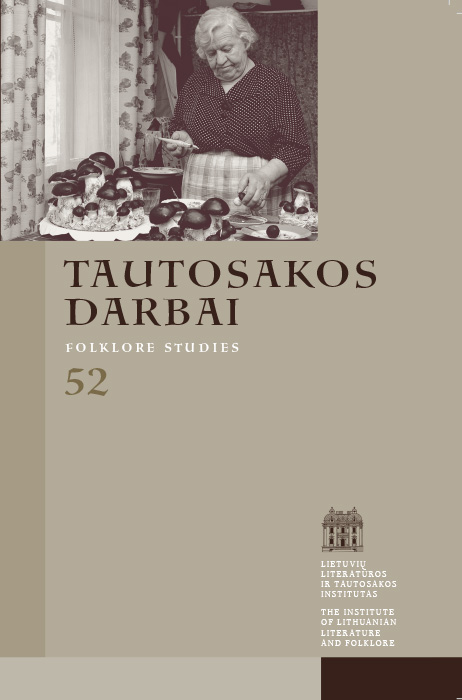Folksong Perception by Balys Sruoga
Abstract
In 2016, Lithuania celebrates the 120th anniversary of Balys Sruoga – “the author of diverse talents”. While surveying ample contemporary research and memoirs on the cultural activity of this outstanding personality – poet, writer, playwright, critic and translator, journalist, and one the most famous specialists in theater and drama of the interwar Lithuania, one may consider Sruoga’s contribution to folklore to be rather modest. Indeed, Sruoga’s works on folklore seem to embrace his miscellaneous cultural activity, producing a peculiar circular composition, since he wrote “Etudes in Folksong Poetics” at the very start of his creative life, in 1924, while during his last years Sruoga edited a collection of selected folksongs. However, due to the ideological constrains of the time, this work saw publication only after his editor’s death, in 1949. Actually, Sruoga used to react quite vividly to various relevant issues of the time, raised by the emerging Lithuanian folkloristics. He contributed articles and press reviews, enthusiastically participated in various discussions, frequently dealing with rather controversial and inconvenient topics. As Sruoga’s inheritance in folklore clearly testifies, folksongs were constantly in the very center of his attention. When discussing folklore, this literary man employed research instruments devised mostly for the literature analysis, which, although rather unpopular nowadays, corresponded to the methodological concepts of the time and enabled him to reveal the artistic qualities of the folksongs. However, even the modern folkloristics does not question the historic value of the studies in folksong poetics by Sruoga. In terms of the modern perspective, the author of the current article discusses various aspects that along with determining the persisting value of Sruoga’s research in the folksong poetics also pushed him towards the margins of the Lithuanian folkloristics. However, the outstanding quality of Sruoga’s writings, his polemic and provocative scholarly discourse, which, far from being formal or routine, displays rare and suggestive essayistic style and language, rendering the readers with ageless enjoyment of reading, deserves special emphasis here.
Downloads
Most read articles by the same author(s)
- Bronė Stundžienė, From the Soviet Folksong Research: Between Free Choice and Obligation , Tautosakos darbai: Vol. 65 (2023): Tautosakos darbai
- Bronė Stundžienė, Folk Couplets against the Background of Historical Memory , Tautosakos darbai: Vol. 63 (2022)
- Bronė Stundžienė, Regarding Expressions of Landscape in Folksongs , Tautosakos darbai: Vol. 47 (2014)
- Bronė Stundžienė, Called by Folksongs: A Book on a Folklore Ensemble , Tautosakos darbai: Vol. 57 (2019)
- Živilė Ramoškaitė, Bronė Stundžienė, Looking at the Horizons of Folksong Research. Živilė Ramoškaitė interviewing Bronė Stundžienė , Tautosakos darbai: Vol. 64 (2022)
- Bronė Stundžienė, The Folksong Narrative of the Family: Ritual Exposures and the Meaning of Shifting Contexts , Tautosakos darbai: Vol. 51 (2016)
- Bronė Stundžienė, The Lithuanian Folk Couplets: On This Side of the Permissible Laughter and Beyond , Tautosakos darbai: Vol. 59 (2020)
- Bronė Stundžienė, Traces of Time in the History of Editing the Book of Lithuanian Folk Songs , Tautosakos darbai: Vol. 61 (2021)
- Bronė Stundžienė, Local Folk Memory in Literary Fiction: the Case of Pasvalys Region , Tautosakos darbai: Vol. 49 (2015)
- Bronė Stundžienė, Turning to the Beginning of the Lithuanian Folksong Publication , Tautosakos darbai: Vol. 56 (2018)




